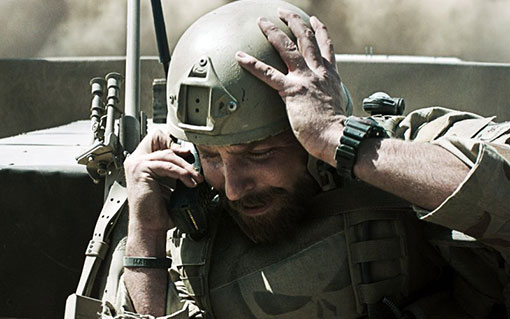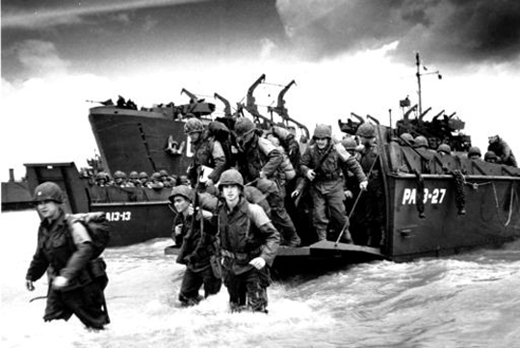Lost in the right/left debate over the new Clint Eastwood film is how few Americans fought this century’s wars, and how the suffering of their families has often gone unnoticed.
During the course of any normal day I usually pay more attention to assembling a grocery list than I do to reading movie reviews, although there are a more than a few film critics who bring huge insight to their work. A.O. Scott of the Times, Joe Morgenstern of the Wall Street Journal and Ty Burr of the Boston Globe are always in my lineup.
But for the past several days it’s been interesting to scan the landscape of different views surrounding American Sniper, the Clint Eastwood-Bradley Cooper film about the life of Chris Kyle, a Navy SEAL who grew up in Texas and served his country – that’s us as in the United States of America—during four tours in Iraq, a war that has managed to mangle two nations, ours and theirs.
Like nearly everything else—a ball game, a rock concert, a political debate—anyone who buys a ticket or takes the time to watch instantly becomes a critic. And today, with twitter and texting and all the other tools we have literally at our fingertips, a debate quickly turns into a cyber-space brawl.
People on the left go back and forth with those on the right about the movie’s merits. Is it pro-war? Is it anti-war? And while a platoon of professional essayists, film aficionados and all around ‘I’m smarter-than-you’ folks attack one another’s opinions, there seem to be a couple items that have been forgotten along the side of the long road we’ve traveled for 15 years—15 years!—in Iraq and Afghanistan.
The most obvious is the lack of attention paid to the fact that only about one percent of our population has borne the weight of war. Then there are the families left behind while those fighting are deployed multiple times to both theaters—Iraq and Afghanistan—breaking the military and too often breaking those who sit state-side, worrying, waiting, while 99% of everyone around them dances through the day without any real prospect of danger or death knocking on their door.
In a lot of the reviews of American Sniper that obvious fact is not mentioned. Instead there is amazement at how popular the movie has been since it was released nation-wide a week and half ago, wracking up record box-office returns.
But a strong case can be made that Eastwood and Cooper have produced one of the few films that go beyond an attempt to put the reality of war on a big screen. That is an impossible venture. Nothing can ever come close to the actual violence, fear, noise, clamor, courage, carnage, and the mind altering, lingering, lasting damage done by war to those charged with fighting it.
Yet there is a scene in Sniper that gets to what veterans of wars carry forever and what that burden has meant to all those who wore the uniform from Cemetery Ridge, Somme, The Bulge, Iwo Jima, Chosin Reservoir, Hue City, Mosul, Helmand Province and hundreds of other spots scarred by war: the scene in which Bradley Cooper and his son are in a garage waiting to pick up their car.
The boy is approached by a young Marine who lost his leg in Fallujah. He tells Chris Kyle’s child that his dad is a true hero who saved his life and the lives of other Marines through the devastating skill of his marksmanship, a sniper watching over the constant danger on the urban battlefield below.
Cooper barely moves, hardly utters a line. Instead, the toll of who he is and what he has done and what he must surely never want his little boy to endure is in his eyes and on his face, a portrait of inner pain he wrestles with daily.
A friend of mine who worked on American Sniper for months and attended several screenings in places as different as Dallas, Los Angeles, New York City and Washington D.C. had an interesting observation that mutes some of the ideological ‘wars’ that have consumed multiple critics conducting operations from the safety of their laptops and iPhones.
It revolved around the scene where Chris Kyle sights, shoots and kills the major-league caliber Iraqi sniper from a distance of more than a mile away. In a sand storm.
At a screening in L.A. and New York, the crowd cheered. In Dallas there was no cheering. And when the film was screened at one site in Washington there was only a heavy silence.
Where was that location? Walter Reed National Medical Center, where the wounded, the limbless, the brain damaged are treated for injuries that linger forever and are largely forgotten by a country and a culture where more attention is paid to deflated footballs than the needs and cost of caring for men and women who fought in Iraq and Afghanistan.
American Sniper is a movie. War is a grim reality and with us still.
https://www.thedailybeast.com/articles/2015/01/25/what-american-sniper-gets-right.html
In a special Morning Joe program on D-Day: A Celebration of Heroes, Mike speaks with 94-year-old veteran Lawrence Brannon from Morristown, TN, whose days have been forever shaped by what happened in Normandy seven decades ago. “It was…hell,” says Brannon. “I lived 1,000 years that day.” Adds Mike: “Those who died in Europe serve as a daily reminder of the horror of war and the price of freedom and democracy.” On MSNBC.
https://www.youtube.com/watch?v=UNGG4M97w78&feature=youtu.be
He is one of 70 from Iowa killed in Iraq or Afghanistan fighting two wars that have had so few serving for so long as America plods into the second decade of a new century, exhausted and isolated from battles that crush the families of the fallen at home.
“I was just looking at a picture of Tommy and his older brother Joe,” Mary Ellen Ward was saying the other day. “It was taken on Oct. 31, 1987.
“He would have been about five years old. His brother was seven. A Halloween picture. Joe was dressed as a Ninja. Tom was in camouflage. He always wanted to be a Marine.
“The last time I talked to him was Christmas Day, a few days before he was killed. He was going to play flag football in the sand. He was on his second tour.”
“How old was he,” his mother was asked.
“Twenty-two,” she answered. “He was only 22.”
“It’s funny,” she was saying, “but the last time he was home, just before he left for his second tour of Iraq, we went shopping, just the two of us. And I had this feeling, this strange feeling, that I’m never going to see him again. I knew…I just knew.”
Across Iowa, the candidates appear in cities and towns like fast-moving clouds pushed across the flat landscape on a wind of ambition. Here is a Gingrich, then a Romney, a Santorum, a Paul, a Bachmann or Perry smiling, glad-handing, promoting, promising, pleading to be sent forward to New Hampshire and beyond by the handful of Iowans who will show up at caucuses Tuesday night.
“I don’t have much interest in it, politics,” said Mary Ellen Ward, who works for the state Child Support Recovery Unit. “And I kind of hate to say this but I think we ought to get everybody out of there, out of Congress. Why does it cost so much to run? I don’t understand that. Why do they get free health care, better health care than the rest of us do, for nothing? They get a nice pension too. They shouldn’t be serving more than two terms either. And none of them talk about the wars. It’s like it’s not there to them.”
She lives with her husband Larry in a city framed by the mythic elements of the country’s history. Council Bluffs sits at the edge of the great Missouri River, separated from Omaha, Neb., by waters that divide two states and dominate the landscape. It was once a huge railroad center when America moved mostly by train, before the automobile, the interstates, long after Lewis and Clark came through on the way to the Pacific.
The town, like most, has a narrative to it, a story that is both parochial and universal: It was built by pioneers who suffered and prospered yet greeted each sunrise with a sense of optimism.
Now, in a country confronted with and confused by political people, including an incumbent, all submitting a job application for the position of president of the United States, anxiety about the immediate future fills the air. The economy has flat-lined for three years. Washington is totally isolated from the rhythms, the mood, the fears and apprehension felt by most Americans. And the wars drag on, touching only the few who serve and their families who remain here, praying nobody knocks on the door at night to tell them a sniper, an IED, an ambush or a fire-fight has claimed a son, husband, daughter or dad.
So on Jan. 3, 2012, as candidates organize and hope for a finish that will fuel a continued campaign, Mary Ellen Ward will again – and daily – think of her son Tommy: Sgt. Thomas E. Houser, USMC, 2nd Force Reconnaissance Company, First Marine Division, killed on this day in 2005 in Iraq.
And she will barely notice the passing parade of politics because she has other concerns, another worry, one more mother’s burden: Her oldest boy, Joe, is scheduled to depart with the Marines in two months. For Afghanistan. For another tour in a war that has made much of our nation weary and too many of our politicians silent.
Mike Barnicle is an award-winning print and broadcast journalist and regular on MSNBC’s “Morning Joe”.
Globe Columnist
July 20, 2011
Next time you feel like ripping Terry Francona, try to remember that the man has a lot on his mind. The manager’s son, Nick Francona, a former pitcher at the University of Pennsylvania, is a lieutenant in the United States Marine Corps, serving a six-month tour, leading a rifle platoon in Afghanistan. Twenty-six-year-old Nick is one of the more impressive young men you’ll ever meet. In a terrific piece for Grantland.com, Mike Barnicle asked Terry Francona how’s he doing as the dad of one of our soldiers at war. “I’m doing awful,’’ answered the manager. “My wife’s doing worse. I think about it all the time. Worry about it all the time. Hard not to. Try and stay away from the news about it. Try not to watch TV when stories about it are on, but it’s there, you know? It’s always there.’’
Wednesday, December 9, 2009
The Afghan War Through a Marine Mother’s Eyes
By Mike Barnicle
Nearly everything is a sad a sad reminder for Mélida Arredondo: the news on TV, stories in the paper, speeches of Barack Obama and others who talk about a war that seems to have lasted so long and affected so many lives, those lost as well as those left behind.
“Did your son like the Marine Corps?” I ask her.
“Yes,” she replies. “He loved it.”
“And why did he join?”
“Too poor to go to college,” Mélida Arredondo says.
Alexander Arredondo enlisted at 17 and was killed at 20 in Najaf during his second deployment in Iraq. He died on his father’s birthday, Aug. 25, 2004, when Carlos Arredondo turned 44.
“My husband almost killed himself in grief,” his wife says. “The day [the Marines] came to tell us Alex was dead, he poured gasoline all over himself and all over the inside of [their] car and lit it on fire. He survived … physically.”
Read the rest of Mike’s column at Time.com
Friday, Oct. 16, 2009
One Death in Afghanistan: Ben Sklaver’s Story
Last week, Laura and Gary Sklaver buried their oldest boy, Ben, who was 32 when killed by a suicide bomber in the remote village of Murcheh in the distant land of Afghanistan. Ben was a captain in the United States Army. Now he has become one of 804 Americans, 37 from Connecticut, to lose their lives in an expanding war that belongs mostly to the parents and families of those who serve a nation preoccupied by a wounded economy and political polarization.
“He didn’t have to go,” Laura Sklaver said the other day. “His obligation was up in May.”
“But he was recalled in March,” Gary Sklaver added. “And he didn’t want to leave his men.”
Ben Sklaver grew up drawn to service. He admired his grandfather who served with Patton’s Army in World War II. He joined ROTC at Tufts, received a Master’s in international relations from the Fletcher School of Diplomacy, was commissioned as an officer in the Army Reserve in 2003 and became convinced that a world consumed with conflict and terror might be changed by Americans bringing clean water, medicine and food as much as by drones, missiles and military might.
10/05/09: Barnicle talks with Jim Braude and Margery Eegan about David Letterman admitting to having affairs with women who worked for him and the situation in Afghanistan.
Listen here: https://barnicle.969fmtalk.mobi/2009/10/05/10509-david-letterman-affairsafghanistan.aspx
“Barnicle’s View”, with Mike Barnicle, Imus in the Morning, Monday-Wednesday-Friday, 6:55a & 8:55a.
09/25/09: Barnicle on the war in Afghanistan.
Listen here: https://barnicle.969fmtalk.mobi/2009/09/25/92509-afghanistan.aspx
“Barnicle’s View”, with Mike Barnicle, Imus in the Morning, Monday-Wednesday-Friday, 6:55a & 8:55a.
09/18/09: Barnicle talks about Jared Monti receiving the Medal of Honor yesterday.
Listen here: https://barnicle.969fmtalk.mobi/2009/09/18/91809-jared-montimedal-of-honor.aspx
“Barnicle’s View”, with Mike Barnicle, Imus in the Morning, Monday-Wednesday-Friday, 6:55a & 8:55a.
9/11/09: Barnicle remembers September 11, 2001, specifically focusing on how we all felt the next day when we were one people united against a common foe.
Listen here: https://barnicle.969fmtalk.mobi/2009/09/11/91109-remembering-911.aspx
“Barnicle’s View”, with Mike Barnicle, Imus in the Morning, Monday-Wednesday-Friday, 6:55a & 8:55a.
8/31/09: Barnicle talks about the life of Michael Davey, a 34-year-old police officer, war veteran, husband and father cut short after he was struck by a 79-year-old driver last week.
Listen here: https://barnicle.969fmtalk.mobi/2009/08/31/83109-michael-davey.aspx
“Barnicle’s View”, with Mike Barnicle, Imus in the Morning, Monday-Wednesday-Friday, 6:55a & 8:55a.

Yarmouth Police Lt. Steven Xiarhos pauses at the casket of his son Nicholas Xiarhos. (Photo by Steve Heaslip / Cape Cod Times)
On a soft summer morning last week, when much of the nation’s media exploded with coverage of the prior night’s White House gathering of a president, a professor, and a policeman, hundreds of ordinary strangers stood like silent sentries along a busy Cape Cod road to salute a funeral hearse carrying a noble young Marine killed in Afghanistan. His name was Nicholas Xiarhos, Corporal Nicholas Xiarhos, 2nd Battalion, 8th Marines, 21 when a war fought by so few claimed him as one of the latest of 768 victims wearing the uniform of the United States of America in Operation Enduring Freedom, the violent effort to tame the Taliban in a land largely unchanged across the centuries.
A Cadillac hearse slowly carried the flag-draped coffin along Route 28, from St. George’s Greek Orthodox Church in Centerville to Bourne and the National Cemetery where Xiarhos was buried. The procession stretched for miles beneath a warm drizzle and a gunmetal gray sky.
Along the way, there were people, hundreds of them; people who were, for the moment, not consumed with health-care debates, deficits, bailouts for big banks, birthers, or house arrests in Cambridge.
It passed ice cream shops and supermarkets, malls and movie theaters, pharmacies and golf clubs, and all along the way, there were people, hundreds of them; people who were, for the moment, not consumed with health-care debates, deficits, bailouts for big banks, birthers, or house arrests in Cambridge.
They stood by their cars, stopped by the side of the road to let the long parade of grief pass. They held children on their shoulders, American flags and homemade posters in their grasp. They had hands over hearts and tears in their eyes for a boy most never met and a crushed family: the father, Lieutenant Steven Xiarhos, wearing the full dress uniform of the Cape Cod police department he has served for 30 years, the mother, Lisa Xiarhos, the dead Marine’s twin sisters, and younger brother.
The roadside mourners were of all ages and from several states, joined now in a unique American moment, a tribute to a casualty of a long war that has affected so few families in this country of such short memory. Witnesses to brutal reality.
 Steven Xiarhos snapped this photo of his wife, Lisa, and their son, Nick, at Camp Lejeune in North Carolina on Sept. 1.At the cemetery, the mist became rain and thunder announced itself in the distance. A color guard responded to nature’s noise with a 21-gun salute. A bagpipe brigade played “God Bless America.” His mother was presented with the gift of a grateful nation, the folded flag that protected the coffin carrying a son who died protecting others.
Steven Xiarhos snapped this photo of his wife, Lisa, and their son, Nick, at Camp Lejeune in North Carolina on Sept. 1.At the cemetery, the mist became rain and thunder announced itself in the distance. A color guard responded to nature’s noise with a 21-gun salute. A bagpipe brigade played “God Bless America.” His mother was presented with the gift of a grateful nation, the folded flag that protected the coffin carrying a son who died protecting others.
Three summers ago, Nick Xiarhos graduated from high school. In the 36 months since his senior prom, he fought in Iraq, returned to Cape Cod, redeployed to Afghanistan, and had now come home forever to a country and a culture that simply does not place enough value on the loss of those who go to a war that sometimes seems as forgotten as those who fight it.
Mike Barnicle has been a newspaper—remember them?—columnist for 35 years. He is a contributing commentator on MSNBC’s Morning Joe program.
8/3/09: Barnicle juxtaposes killings in Dorchester and Lawrence over the weekend, focusing on the the sad, personal story of a hard working immigrant who was murdered while delivering Chinese food and living the American dream.
Listen here: https://barnicle.969fmtalk.mobi/2009/08/03/8309-murders-in-dorchester-and-lawrence-this-past-weekweekend.aspx
“Barnicle’s View”, with Mike Barnicle, Imus in the Morning, Monday-Wednesday-Friday, 6:55a & 8:55a.
7/27/09: Barnicle tells the story of Marine Cpl. Nicholas Xiarhos, a local 21-year-old man who died recently in Afghanistan, and the minimal newspaper coverage of his and other soldiers’ deaths.
Listen here: https://barnicle.969fmtalk.mobi/2009/07/27/72709-marine-cpl-nicholas-xiarhos.aspx?ref=rss
“Barnicle’s View”, with Mike Barnicle, Imus in the Morning, Monday-Wednesday-Friday, 6:55a & 8:55a.
7/17/09: Barnicle gives a thumbs up to Summit Entertainment’s new Iraq War movie “The Hurt Locker,” calling it “as real as any war movie ever made.”
Listen here: https://barnicle.969fmtalk.mobi/2009/07/17/71709-the-movie-the-hurt-locker.aspx
“Barnicle’s View”, with Mike Barnicle, Imus in the Morning, Monday-Wednesday-Friday, 6:55a & 8:55a.
6/17/09: Barnicle talks about the Iran situation and our relationship with the country following their presidential election next week.
Listen here: https://barnicle.969fmtalk.mobi/2009/06/17/61709-iran-situation.aspx
“Barnicle’s View”, with Mike Barnicle, Imus in the Morning, Monday-Wednesday-Friday, 6:55a & 8:55a.
5/13/09: Barnicle talks about former Vice President Dick Cheney’s poor judgment and why we shouldn’t care about what he says.
Listen here: https://barnicle.969fmtalk.mobi/2009/05/13/51309-vp-dick-cheney.aspx?ref=rss
“Barnicle’s View”, with Mike Barnicle, Imus in the Morning, Monday-Wednesday-Friday, 6:55a & 8:55a.
11/10/08: Veterans Day and how these days people just treat it as another day.
Listen here: https://barnicle.969fmtalk.mobi/2008/11/10/111008-veterans-day.aspx
“Barnicle’s View”, with Mike Barnicle, Imus in the Morning, Monday-Wednesday-Friday, 6:55a & 8:55a
8/22/08: Mike recommends the book “Generation Kill” by Evan Wright
Listen here: https://barnicle.969fmtalk.mobi/2008/08/22/82208-book-generation-kill.aspx
“Barnicle’s View”, with Mike Barnicle, Imus in the Morning, Monday-Wednesday-Friday, 6:55a & 8:55a.
8/18/08: A tragic story from this past week of two service men from Cape Cod killed in Iraq and Afghanistan
Listen here: https://barnicle.969fmtalk.mobi/2008/08/18/81508-nation-still-at-war.aspx
“Barnicle’s View”, with Mike Barnicle, Imus in the Morning, Monday-Wednesday-Friday, 6:55a & 8:55a.












